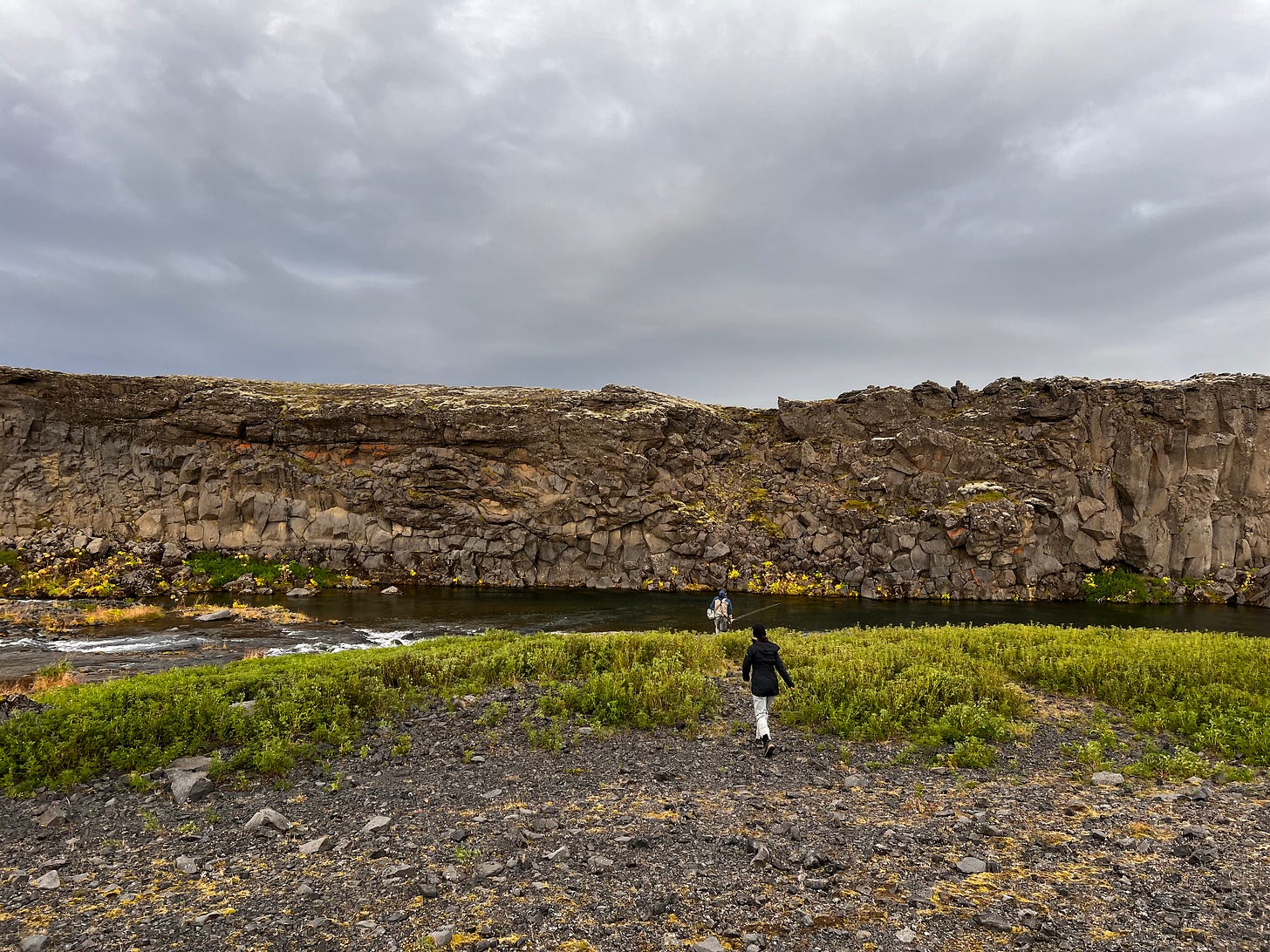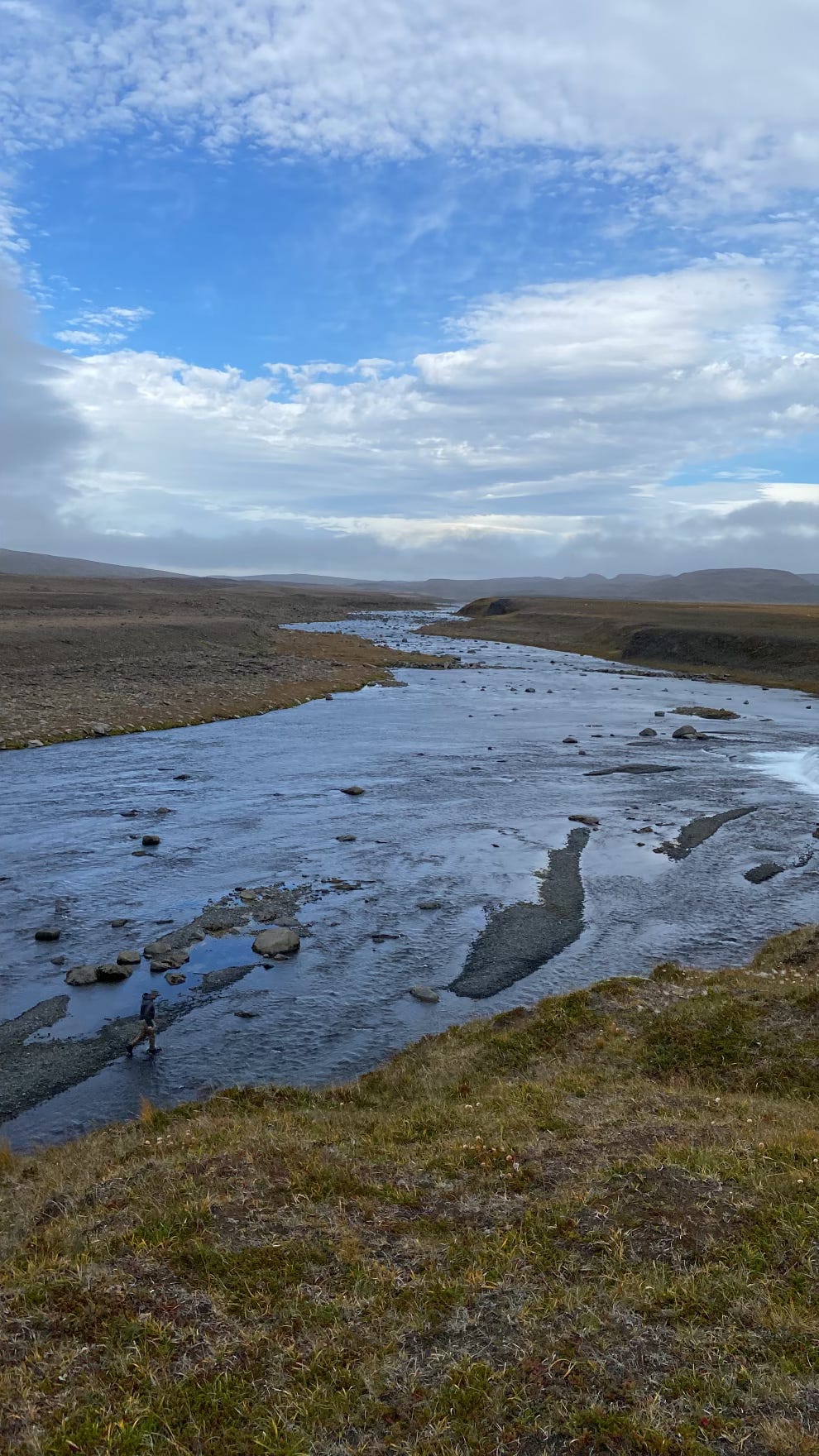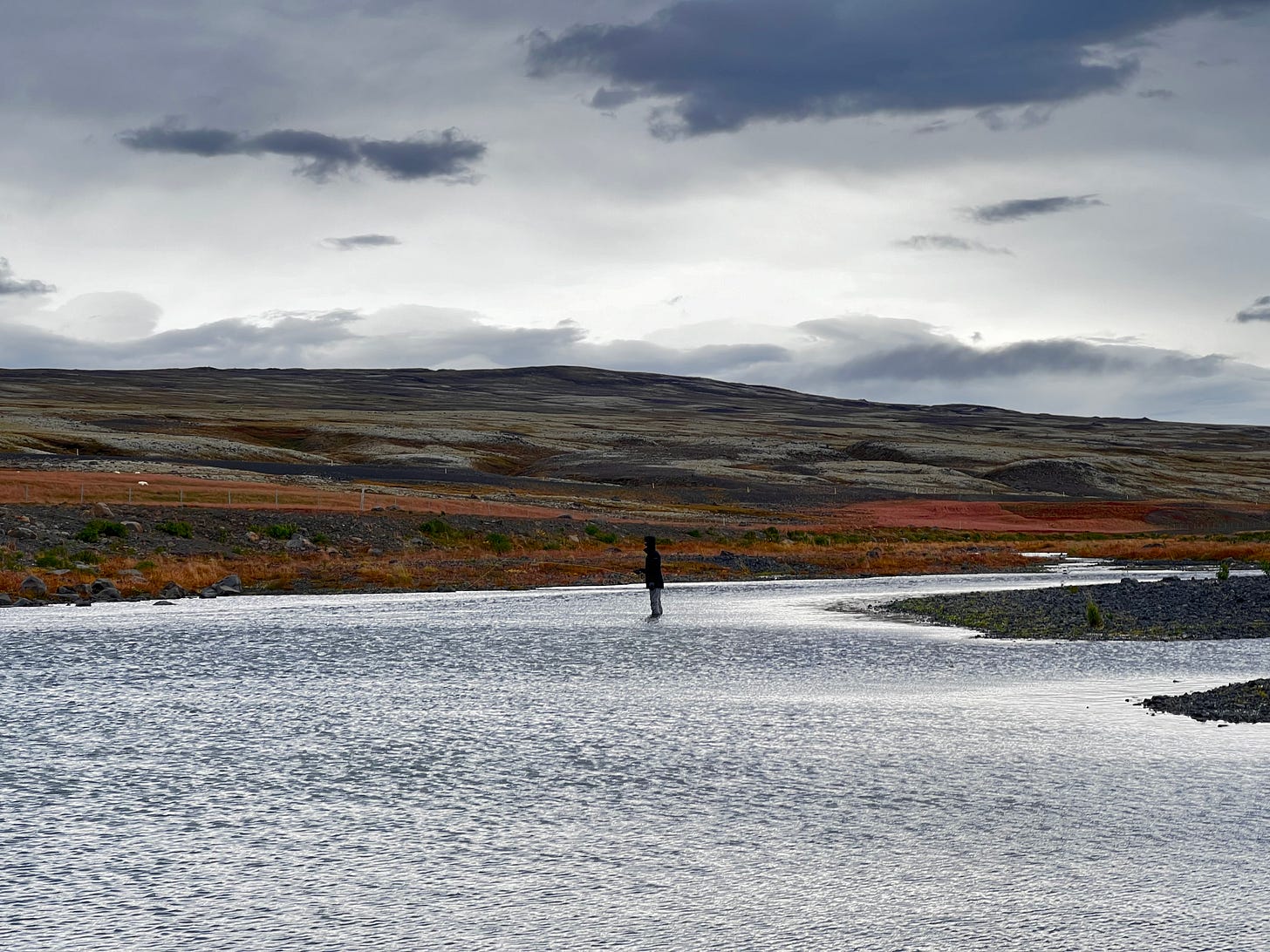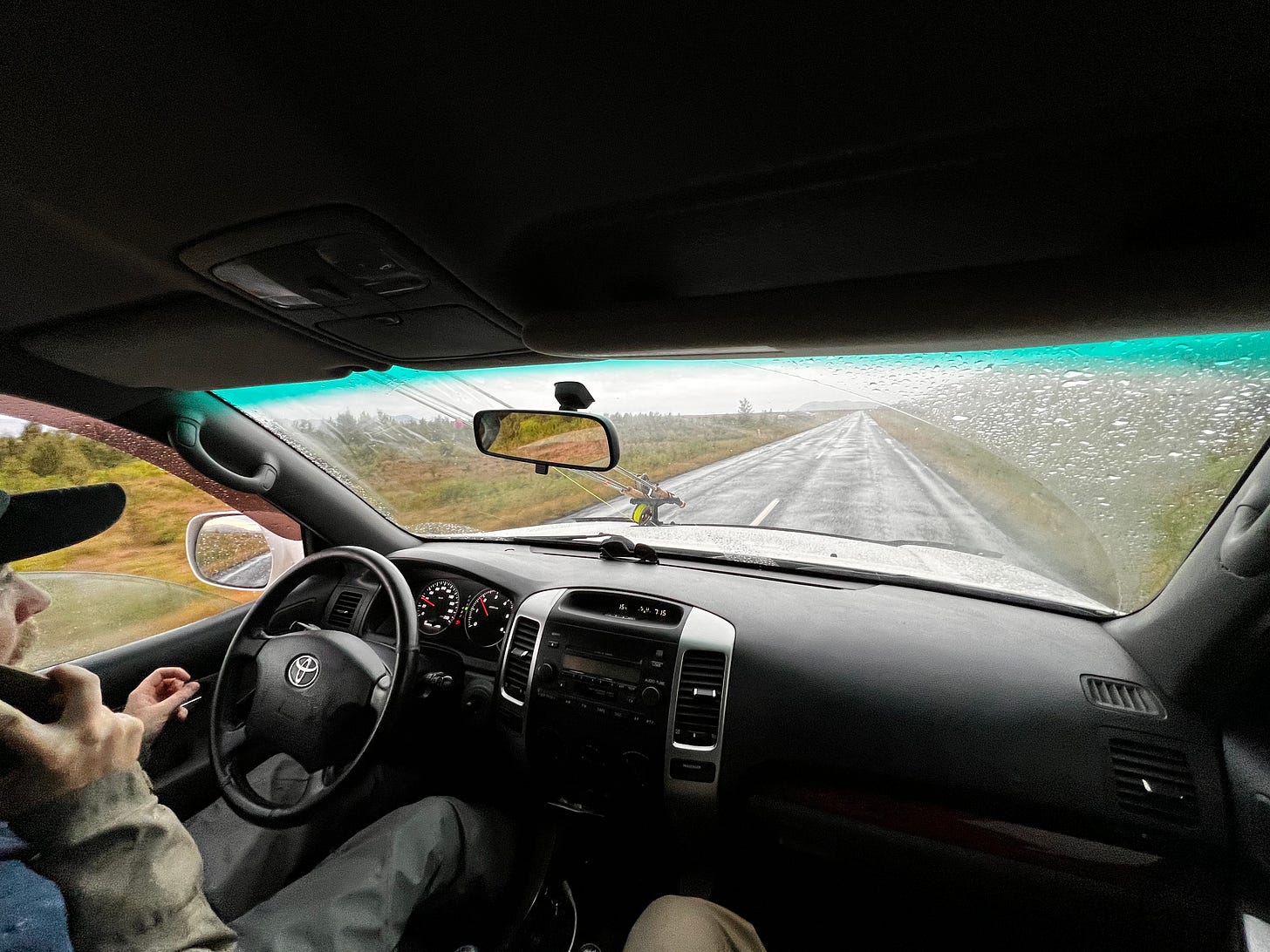Arctic Char and 40-Grit Sandpaper
From Iceland’s rivers to a dusty garage, learning that sometimes what we’re after slips away — but what remains is often more valuable.
About twenty minutes into sanding, I realize that I have made a mistake. This is not how to get the job done. But I just keep going, grinding away the soft pine boards with abandon, getting back to daydreaming about Iceland, love, and the one that got away.
In the basement of the house is a half finished work bench left behind by the previous owners. An old wrought base topped with a series of cutoff 2x4s glued together to form a rectangle. Dried glue had gone solid in bubbles and long brown drips, chemical stalagmites protruding from the surface of the boards now fused into an uneven monolith. Perhaps that’s why it was abandoned, I thought to myself earlier that morning while still determining its future, a cup of hot coffee in hand.
Flat surfaces are a commodity, especially in a garage, and I have a bad habit of squandering them until the piles become landslides, the contents of the dusty boxes long forgotten. Just a few hours ago, the workbench was still covered with odds and ends. A gaggle of old cell phone chargers and cables, a jar of mixed screws, a few piles of old documents in cracked plastic file folders, a revolving assortment of hand tools pulled from tool boxes and never put away.
Creating a flat surface is best done with machines like a planer, or traditionally, a large heavy hand plane. I don’t own these tools, so I’m improvising. I pull a worn disc of 40-grit sandpaper from the velcro-backed pad of the sander and replace it with a fresh one.
I return to Iceland in my mind, diving back into the moment when I watched the arctic char shift slightly off his line to eat the peeping caddis that was dropped off the hook bend of a bushy dry fly. He’s in two, maybe three feet of water so clear, that I can see the white freckles on his slate flanks, the brush stroke of white that edges his pert pectorals. I don’t sense the take, nor does the dry fly indicate it, but I see his mouth open and his gill plates flare and I know that he’s eaten. I set, he makes a few frenzied circuits around the shallow run, and then sounds for the deep pool below, pulling line and a long exhale of my breath with him.
The day is young. Sindri, our lighthearted guide, spotted this char just minutes into fishing our first spot. The quickness with which it has happened feels dreamlike, and I don’t realize that I’ve already slipped into the expectant complacency of thinking that today will be one for the books. I raise the rod and give a little whoop to Fjolla who’s just downstream, my grin telling the whole story.
She whoops back, sets down her rod, and reaches for her phone to snap some pictures of my first ever arctic char on the fly. But before she can free it from her layers of fleece and Gore Tex, the line goes unceremoniously limp. The fish is gone before any of us realize it; the barbless nymph has slipped out. We all groan and then laugh. Catching fish so early in the day is usually a sign of good things to come, and we all believe we’ll get plenty of other shots.
Sindri leads us upstream to another spot. We like Sindri. He’s low key and has a sense of humor, all wool and a yard wide. Fjolla and I slosh behind him as he weaves through tufts of grass and jumbles of sharp volcanic rocks. This is our first fishing adventure together and I check in with her about what she thinks, if she’s warm enough, how the rental wading boots are fitting. The day of fishing, shoehorned into our five-day van camping trip across the southern coast of Iceland, is a gift within a gift she’s given me for my fortieth birthday. It's early, I can already tell she’s psyched herself up for whatever lies ahead. I shake my head in disbelief at my good fortune, at having found someone with so much grit, someone who loves me enough to jump headlong into a day of fishing in the unpredictable weather of the highlands of Iceland.
The next spot is a deep pool cut into the shale by a sluice of glacial water pressed out between harder igneous rocks. We creep along the aqua blue water, careful not to slip. Sindri gently reminds us that we’re a long way from the truck; this is no place for a swim. I huck a streamer upstream and let it fall into the gin clear depths while working it slowly back. I can see several big char, the size of my arm, lifting off the bottom to inspect the fly. One follows but refuses. Another darts back to the cover of an undercut. We try a few different flies and I do my best to land the casts artfully, suddenly aware that I’m being watched from below and above.
The workbench is stubborn and I replace the disc again. My dog lazes in the afternoon sun and looks at me when I turn off the sander, perhaps wondering what’s taking me so long. I’ve managed to flatten a foot and a half of one side of the top. It’s slow going, meditative. The whir of the toothy sandpaper against the soft pine buzzes up through my hand into my wrist and up the radius of my forearm. My brain hovers in the in between, freed from the frenetic flak of thinking by the simple, monotonous work.
Fjolla steps up to the edge and I watch Sindri instruct her. He’s a careful and patient teacher, quick to smile and compliment her short roll casts. It’s a windy day and gusts drop over the top of the cut and swirl over the pool. A troupe of small char — six inches or so — is picking midges of the surface and Fjolla hooks a few of them. They jump and skitter the way little trout do, a few hopping off the hook before Sindri can stoop and net them. I hear her giggle, and when she catches me watching her she smiles. Behind the hood of her raincoat drawn tight around her face her cheeks and nose are red and wind whipped. She’s a marvel, totally out of her element but doing great. I feel warm all over.
Back in the truck I pepper Sindri with questions. He tells me about the typical Icelandic season and when the fishing is best. He points out the squat lodge on the edge of a wide lake where they take guests in the summer. He tells us about growing up in Iceland, catching lingcod on spinning rods from the docks of Reykjavik, and vacations in the highlands with his family in their 4x4 Ford Econoline van. I’m surprised when we pull off the main dirt road at speed, tumbling over potholes and washboards toward a grassy hill overlooking a wide glacial valley. He stops the truck with a lurch and reminds us to hold onto our doors when we exit lest the wind fold the hinges back on themselves.
Sindri tells us the name of the river, a string of words in Icelandic that sound ancient and mysterious but that translate, he tells us, to Cold River. At the edge of the bluff he tests me by asking how many char I can spot. I scan and look for signs of life but can’t spot a fish. I consider lying but decide against it. He smirks and tells me he can see about twenty. Here, he points, there and there. He waves for us to follow and we do, steeling ourselves against the wind that is buffeting the valley.
The Cold River is aptly named. It’s only knee deep here but spread out in a Rorschach of flat light gray stones surrounded by fine black sand. The stones are slick and Sindri shows us how to slide our boots through the sandy spots for traction. We work out into the meat of the run and Sindri sets me loose, warning me to avoid getting too far downstream; it gets deep quick, he adds. I take pride in the fact that he’s deemed me proficient enough to self guide here, and am glad to see him stay close to Fjolla, helping her wade and make her first few casts with the 8 weight he’s rigged with two nymphs and an indicator.
I can’t see the fish, but the water is readable, so I fish, wondering how I’ll land a char if it decides to turn tail and run toward the lake below. There’s nothing to choke a cast here and I fling the indicator rig freely, feeling out the wind and the drift. Everything feels otherworldly and I relish in the feeling of being an alien in this landscape,
After fifteen minutes or so, Sindri makes his way to me and asks me why I’m not casting to the char five feet off my rod tip. Right there, he points. The char here are native, wild fish, and they possess the kind of camouflage that only comes from eons of evolution. I strain to see through the choppy water and finally spot the fish when it sways to take a nymph, teasing me with its pale orange belly. I make a few casts, switch flies, and make a few more. The wind is howling in gusts that blow froth off the tops of the choppy current. Upstream, Fjolla is casting dutifully and I can’t help but chuckle. If she only knew how tough these conditions were, I muse.
If woodworking is an art, what I am doing to this workbench feels like an abomination. For a moment I start to calculate the diminishing returns of my time, the cost of the sandpaper, the wear on the machine. I survey my work and find that nearly half the workbench is evened out, with only a few high spots left to work down. I’m amazed that this crude approach is working. I feel a sense of pride shoot through my neurons. I refresh the disc and get back to the daydream.
With no willing char in the Cold River, Sindri calls an audible. We traverse several kilometers of bone-rattling F-roads, the seasonal dirt tracks that crisscross the remote parts of the interior, shouting over the rumble of the Toyota and the music that leaks through on a patchy radio station. Sindri tells us about another husband and wife duo that he guided a few years earlier. When the wife outfished the husband, he blew his top, threw his rod in the river, and stomped back to the truck to pout.
Guides, especially experienced ones, share their wisdom in little allegories like this. What he’s telling us — and me, specifically — is that the conditions are tough and to not spoil the day with a bad attitude. I’ve been known to get sour when the fishing is tough, and for a moment I wonder if my reputation has somehow made it across the Atlantic. But his hedging is unnecessary. The day feels adventurous and I’m ecstatic to be exploring this incredible countryside with Fjolla. This is the stuff we’ll remember when we’re old and gray.
Sindri and I fish a half mile of the next river together while Fjolla naps in the truck. It is clear and low but he’d seen some sea-run brown trout feeding a few days earlier and figured it was worth a quick look. I bounce a bead head streamer off the basalt rocks on the far bank while walking. It’s late afternoon and we’ve yet to find another willing fish. I can sense that he is getting frustrated at the lack of action. We both know that a few dry days in a row has stemmed the feeding and that this late in the season our targets are limited. You should come in June, he offers as I work the streamer around a boulder. Char like this, he holds his hands out measuring an imaginary fish, on dry flies. I won’t lie, that sounds pretty good. I reel up and we scamper back to the vehicle.
It's easy to get down on your luck when things don’t pan out the way you’d hoped. But I’ve learned that in most circumstances, having low expectations for the outcome can alleviate frustration and dented hopes. The trick is to be happy in the doing, thankful for the things that will, eventually, be looked back on as a relative luxury. Disappointment stems from a flawed mindset.
We head back downhill, which I know is a sign that we’re working our way back to the valley. His phone rings and he answers, speaking in Icelandic. I imagine what he’s saying while trying to pick up bits of info. It’s no use. Icelandic is as otherworldly as the countryside, so I am left to wonder who’s on the other end of the call. He negotiates the road at full speed with the phone in his right hand, pausing his conversation to downshift before hanging up. I am surprised when Sindri veers off the main road again. One more spot, he says, a...what do you call it...hail Mary.
Sindri hops out and surveys the run. Fjolla says she’s going to stay in the truck, and I linger in the warmth of the vents blasting hot air onto my feet. He’s a good guide, she remarks, and I agree. You never know what you’ll get when you hire a guide, and Sindri has exceeded our expectations. He waves to me and points to a shallow riffle at the head of a slow moving flat. They like this spot, he tells me as he ties on a small zebra midge. Maybe they like it today, he adds.
When you fish long enough, you learn the extent to which you can beat up a run. Fish are canny, especially wild ones, and you usually only get a handful of presentations before they get wise to your flies. After fifteen drifts through the riffle, I resign to Sindri that we should probably call it a day. I keep fishing though, mechanically roll casting into the one spot that looks likely to hold a fish. Then, the indicator bobs.
There’s a fight, the kind you hope for. I’m jubilant and Fjolla springs from the truck, iPhone at the ready. Sindri’s smiling. I play the char as carefully as my numb fingers will allow, guiding him slowly but surely to the net. Sindri scoops and the net bulges gray-green and orange. We all cheer, a joint celebration that at once acknowledges the grueling day, and the drama of having caught a fish on the hail mary. We’ve done it.
But when Sindri swings the net up to show me the fish, it’s limp and empty; the char is gone. We look at one another in disbelief. Sindri curses. We check Fjolla’s video and discover that the fish got its nose through a small hole in the net, tasted freedom, and forced its way free. Sindri apologizes profusely, ruefully inspecting the ripped netting.
Sindri and I exchange a look, a shared understanding of the strange, unbidden twists that fishing days can take. It’s a loss, sure, but it feels fitting — the kind of memory that hooks deeper than any grip and grin could. Fjolla clicks off the recording, capturing the moment in all its bittersweetness. It’s enough.
Back in my garage, I run my hand over the workbench, now smooth, its ridges and high spots worn down to a level surface. The hours of sanding have left their mark — both on the pine and on me. What was once rough and half-formed now lies flat, ready to be put to use. I can see where I missed a few spots, tiny pits and dips in the wood, but I like the character they add, the story they tell. I set the sander down, feeling a quiet pride, the satisfaction of a job completed, realizing that maybe it’s the work itself that’s the real catch.









